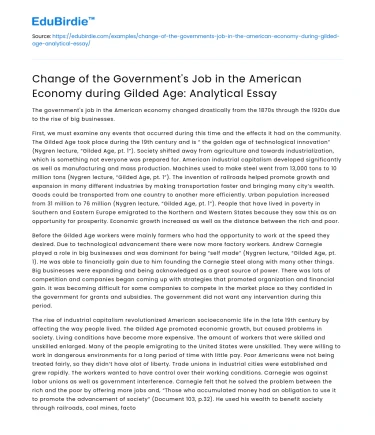The government's job in the American economy changed drastically from the 1870s through the 1920s due to the rise of big businesses.
First, we must examine any events that occurred during this time and the effects it had on the community. The Gilded Age took place during the 19th century and is “ the golden age of technological innovation” (Nygren lecture, “Gilded Age, pt. 1”). Society shifted away from agriculture and towards industrialization, which is something not everyone was prepared for. American industrial capitalism developed significantly as well as manufacturing and mass production. Machines used to make steel went from 13,000 tons to 10 million tons (Nygren lecture, “Gilded Age, pt. 1”). The invention of railroads helped promote growth and expansion in many different industries by making transportation faster and bringing many city’s wealth. Goods could be transported from one country to another more efficiently. Urban population increased from 31 million to 76 million (Nygren lecture, “Gilded Age, pt. 1”). People that have lived in poverty in Southern and Eastern Europe emigrated to the Northern and Western States because they saw this as an opportunity for prosperity. Economic growth increased as well as the distance between the rich and poor.
Save your time!
We can take care of your essay
- Proper editing and formatting
- Free revision, title page, and bibliography
- Flexible prices and money-back guarantee
Before the Gilded Age workers were mainly farmers who had the opportunity to work at the speed they desired. Due to technological advancement there were now more factory workers. Andrew Carnegie played a role in big businesses and was dominant for being “self made” (Nygren lecture, “Gilded Age, pt. 1). He was able to financially gain due to him founding the Carnegie Steel along with many other things. Big businesses were expanding and being acknowledged as a great source of power. There was lots of competition and companies began coming up with strategies that promoted organization and financial gain. It was becoming difficult for some companies to compete in the market place so they confided in the government for grants and subsidies. The government did not want any intervention during this period.
The rise of industrial capitalism revolutionized American socioeconomic life in the late 19th century by affecting the way people lived. The Gilded Age promoted economic growth, but caused problems in society. Living conditions have become more expensive. The amount of workers that were skilled and unskilled enlarged. Many of the people emigrating to the United States were unskilled. They were willing to work in dangerous environments for a long period of time with little pay. Poor Americans were not being treated fairly, so they didn’t have alot of liberty. Trade unions in industrial cities were established and grew rapidly. The workers wanted to have control over their working conditions. Carnegie was against labor unions as well as government interference. Carnegie felt that he solved the problem between the rich and the poor by offering more jobs and, “Those who accumulated money had an obligation to use it to promote the advancement of society” (Document 103, p.32). He used his wealth to benefit society through railroads, coal mines, factories, and many more. Other politicians were seen as helpless and dishonest. They were greedy and did things to their benefit. William Graham Sumner was a social darwinist that believed in the government not interfering and he gave credence to inequality. He felt that government interference threatened the liberty of people.It does not solve the problems that arise within the economy. He felt that social classes owed one another and that the working class was not gaining from the prosperity of wealth. This caused people to feel as if their liberty was being overlooked. The increase in Social Darwinism promoted “a negative definition of freedom as limited government and an unrestrained free market. It also helped to persuade courts, in the name of liberty of contract to overturn state laws regulating behavior of corporations”(Document 104, p.36).
Americans of different classes and backgrounds responded to the problems of the industrial age differently. Big businesses supported no government interference because they didn’t have to pay taxes, so they were able to stay rich. African Americans and famers did not like the fact that the government was not helping because it allowed them to stay poor. Coming from a wealthy background kept alive a rich status. If you came from a not so wealthy background then it was said that that status would be maintained. Certain people were able to make more money than others due to lack of government interference which caused social classes to divide ((Nygren lecture, “Gilded Age, pt. 2).
Did you like this example?
Make sure you submit a unique essay
Our writers will provide you with an essay sample written from scratch: any topic, any deadline, any instructions.
Cite this paper
-
APA
-
MLA
-
Harvard
-
Vancouver
Government’s Role in American Economy during Gilded Age: Analysis.
(2022, July 14). Edubirdie. Retrieved December 25, 2024, from https://edubirdie.com/examples/change-of-the-governments-job-in-the-american-economy-during-gilded-age-analytical-essay/
“Government’s Role in American Economy during Gilded Age: Analysis.” Edubirdie, 14 Jul. 2022, edubirdie.com/examples/change-of-the-governments-job-in-the-american-economy-during-gilded-age-analytical-essay/
Government’s Role in American Economy during Gilded Age: Analysis. [online].
Available at: <https://edubirdie.com/examples/change-of-the-governments-job-in-the-american-economy-during-gilded-age-analytical-essay/> [Accessed 25 Dec. 2024].
Government’s Role in American Economy during Gilded Age: Analysis [Internet]. Edubirdie.
2022 Jul 14 [cited 2024 Dec 25].
Available from: https://edubirdie.com/examples/change-of-the-governments-job-in-the-american-economy-during-gilded-age-analytical-essay/
copy






 Stuck on your essay?
Stuck on your essay?

